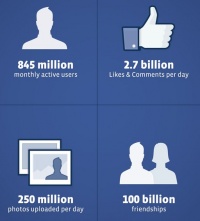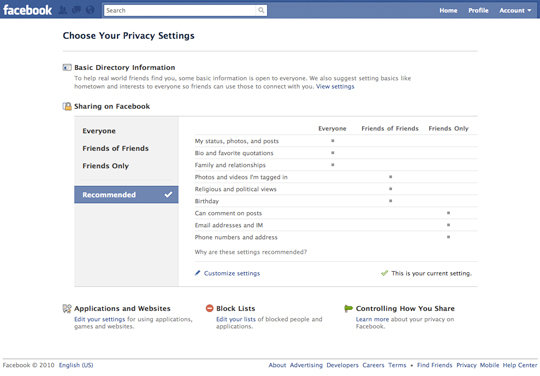Facebook Privacy Policy
Facebook Privacy Policy or "Data Use Policy", describes the ways Facebook collects, stores, uses and protects the personal information of their users. In the realm of social media, Facebook has the most prevalent impact on users with relation to their private information. The policy details the information the site receives, what is classified as public information, and how users can manage their accounts.
Contents
History
Since its incorporation just over five years ago, Facebook has undergone a remarkable transformation. When it started, Facebook was a private space for communication focused on college and university groups. When Facebook moved outside of the college and university sphere and became available to the general public, it transformed into a platform where information was made public by default. However, users were still able to manually edit their privacy settings to make this information private. Today, it has continued to expand, reaching a stage where certain information cannot be made private by the user. This public information may be shared by Facebook with its partner websites and used to target ads.
Statistics
Over 20,000 new accounts are activated each day, and over 90% of people on college campuses have a Facebook account.[1] 90.8% of users have a profile picture, 87.8% choose to show their birthday, 39.9% display a phone number, and 50.8% list their current address on their profile. Additionally, almost all profiles fully identify people with their first and last names.
Development of Privacy Policy
In 2005 Facebook's policy stated, “No personal information that you submit to Facebook will be available to any user of the Web Site who does not belong to at least one of the groups specified by you in your privacy settings”.[2] In the next year, their policy had changed to allow users to have control of their information by limiting what information was displayed on their page. As the website gained more members, they felt it was in their site’s best interest to make user information available to anyone in the same networks. They stated: “Profile information you submit to Facebook will be available to users of Facebook who belong to at least one of the networks you allow to access the information through your privacy settings e.g., school, geography, friends of friends”.[2] By 2010, the site defaulted to an opt-in instead of an opt-out model and made everything available unless the user specified that they wanted it to remain private. Their privacy policy was updated to state: “Information set to the “everyone” option is publicly available information, may be accessed by everyone on the Internet [including people not logged into Facebook], is subject to indexing by third party search engines, may be associated with you outside of Facebook, and may be imported and exported by us and others without privacy limitations”[3]. These successive policies show the evolution of the company. Facebook originally earned its core base of users by offering them simple and powerful controls over their personal information, but as the site gained more members, and could see the benefit of forcing more information to be made public, they have slowly been taking away more privacy controls.
Visual Infographic (policy change by year): http://mattmckeon.com/facebook-privacy/
Data Mining
Facebook collects and analyzes site content without user consent or knowledge. For example, they have added an advertising system called Beacon, which takes user activity from other websites and sent the information to Facebook.[4] The idea behind this was that the friends of a user would see that users actions on their page with a link — something that could be very useful for advertising companies. This was controversial, especially since it monitored all activity, including activity when a user was not logged in to Facebook.
Lawsuits
A class action lawsuit was lodged against the company on behalf of all Facebook users, claiming that the system was too difficult for users to opt out of and the site was not being transparent. In 2009, Facebook settled the suit out of court for $9.5 million along with a promise to shut down the Beacon system.
Facebook caused complaints again in December 2009 by changing some of its default settings to “share-everything”.[5]
In April 2010 the social networking company made another set of changes, one of which was the Instant Personalization program, which shares users’ names and other data with Yelp, Pandora and Microsoft Docs. Users can opt out of this program, but if they don't their information is shared by default. [6]
In October 2010, Facebook was sued for applications and games featured on the site. Popular applications made for the social network, such as FarmVille, Texas HoldEm Poker and FrontierVille, had been sending users' personal information, to dozens of advertising and Internet monitoring companies.[7] Makers of Facebook applications were also sending user ID numbers, which can be used to look up users' names and other information, to outside firms.
EPIC & FTC Complaints
The Electronic Privacy Information Center and 14 other consumer protection groups lodged a formal complaint against Facebook with the Federal Trade Commission. The groups took issue with Facebook's privacy policies and accused the site of unfair and deceptive trade practices that "violate user expectations, diminish user privacy, and contradict Facebook's own representations”.[8] The main concerns are Facebook's Instant Personalization feature, the inability of Facebook users to make the 'Likes and Interests' section of their profile private, and the fact that Facebook discloses user profile information in certain ways even if a user has opted to keep that information private. The complaint called for Facebook to "restore privacy settings that were previously available" and to "give users meaningful control over personal information, and seek other appropriate injunctive and compensatory relief".[8]
Ethics
The main ethical question is: who owns the information posted on Facebook? Even though users can claim to own their own information, Facebook can use it for other purposes, for example, to collect information regarding usage trends, or to collect information to generate advertisements. Users that utilize third party applications are also risking that their information collected for directed advertisements.[9]
Ownership of Information
Everything that a user posts to Facebook is the property of the user. However, Facebook's license agreement describes that with regard to intellectual property (IP) the user gives Facebook a non-exclusive, transferable, sub-licensable, royalty-free, worldwide license to use any IP content that you post on or in connection with Facebook.[10]
References
- ↑ http://www.mediapost.com/publications/?fa=Articles.showArticle&art_aid=13220
- ↑ 2.0 2.1 Facebook: Data Use Policy
- ↑ Facebook: Facebook's Privacy Policy
- ↑ Computerworld: Lawmakers hit Facebook CEO with privacy questions
- ↑ PCWorld: Facebook Hit With Privacy-Violation Lawsuit
- ↑ eSecurity Planet: Privacy Lawsuits Target Facebook, Google, Zynga
- ↑ {http://www.guardian.co.uk/technology/ The Guardian: Technology news, comment and analysis}
- ↑ 8.0 8.1 Epic.org: Facebook Privacy
- ↑ Facebook: Legal Terms


